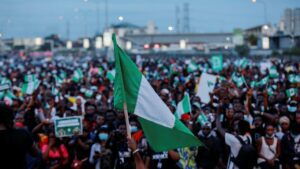
Insecurity: FG should avoid isolating rising scourge with sectional twists
Insecurity in Nigeria has given to the Country discolored representations. Recently, the myriad dimensions which the wings of insecurity have assumed have set in confusion which largely began to put before citizens questions of whether the government itself understands to categorise threats manifesting in different dimensions from different quarters as they are. The clusters of coordinated attacks, increasingly, have become too expansive in different faces such that linking attacks and threats in proper categories, now pose confusion that would only leave many dismayed.
The most recent killings in Imo, South East, rose issues of arguments, counter arguments, allegations, counter allegations and knocks. Controversies over who or what is responsible for the attack became an issue of contest as what the government ascribed the killings to and who it was attached to, became a reaction that attracted wild contradictions. In his reaction to the killings, President Muhammadu Buhari through his Special Assistant on Media, Mallam Garba Shehu, had on Sunday, August 07, 2022 said, “President Muhammadu Buhari condemned in strong terms the recent attacks against non-indigenes and law enforcement officials by terrorists in the South East,” calling on the “community and religious leaders to speak more forcefully against the killings and to stand up and defend the ethos of the nation’s cultural and religious heritage.”
Counteracting slams, however, trailed the position of the President on the killings. The apex Igbo socio-cultural organisation, Ohanaeze Ndigbo, had on Monday, 08, 2022, slammed the President for the position he took on the killings in the South East, arguing that the utterances of the President as the Commander-in-Chief of the Armed Forces of the Federal Republic of Nigeria were not only very uncharitable but mischievous and undiscerning in Its insinuations.
In a statement titled, ‘Insecurity in the South East: Buhari is blaming the victim,’ the President General of Ohanaeze Ndigbo worldwide, Ambassador Professor George Obiozor, said Ohanaeze Ndigbo condemned the killings and violence, but held that victims cannot be blamed for the insecurity imposed on the South East by President Buhari’s administration.
In the statement issued through Ohanaeze National Publicity Secretary, Dr. Alex Ogbonnia, the group said that to appropriate national problems to the South East of Nigeria was an ethnic prejudice taken too far. The statement had read, “Ohanaeze Ndigbo Worldwide joins the Presidency and indeed the good people of Nigeria in condemning this dastardly act that occurred at Imo State, South East of Nigeria. Ohanaeze has repeatedly explained that amongst the Igbo, human life is very sacred. The sanctity of life is so elevated that killing a human being in whatever circumstance is considered an abomination. In fact, it is not in the character of the Igbo to kill in whatever disguise. These recent developments are indeed very much alien to the reflexes, culture, and norms of the South East. And we have often called on the Nigerian security operatives to ensure that the perpetrators of such acts are brought to book as a deterrent to others.
“The apex Igbo body, however, noted that the failure of the Nigerian security agents to fish out the criminals cannot be blamed on the Igbo. Ohaneaeze Ndigbo, however, frowns at the statement by the Presidency, which is nuanced against the South East as a haven for terrorists that attack non-indigenes and law enforcement officials, implying that the insecurity persists because the leaders have not forcefully spoken. This is very unfair to the Igbo, especially when the presidency knows the root cause and the nature of the insecurity in the South East. It needs to be added that the solution to the insecurity in the South East lies in the enormous powers of the presidency.
“The above remarks by the presidency appear to have ignored the prolonged open war with the Boko Haram in the North East; the Banditry in the North West, especially in Katsina State; the Fulani Herdsmen invasion of several communities in the Middle Belt region; the Church massacre at Owo; the daily kidnappings on our highways; the Kaduna-Abuja train abduction, etc,.Paradoxically, when the district head of Daura, the hometown of Mr President, was kidnapped and was freed after two months, Mallam Garba Shehu was quoted as saying that the “Incident was evidence that Duara was not receiving preferential treatment and that insecurity was a national problem. In other words, when insecurity manifests in the North West, it is a national problem; but when, on the other hand, it occurs in the South East, it is blamed on the inability of the ‘community and religious leaders to speak more forcefully against the killings and to stand up and defend the ethos of the nation’s cultural and religious heritage’.
“The Igbo possess the greatest wanderlust as well as the most hospitable dispositions amongst the various ethnicities in the world. The non-indigenes in the South East enjoy untrammeled friendliness, inter-ethnic assimilation and a conducive business environment; what happened to the non-indigenes in the South East is most regrettable as part of the current national calamity. One would think that the inevitable consequences of the orchestrated mendacious propaganda, dubiety, subterfuge, sabotage, and serial alienation against the South East of Nigeria are already staring us in the face. How do we fight insecurity by appointment of service chiefs based on ethnocentric and religious considerations as against the best global practices of military competence?
“Put differently, how can the South East be excluded among the over 16 service chiefs in the Nigerian armed and paramilitary forces and expect insecurity not to fester? And how; and how; and how…..? And when the chickens have come home to roost, we resort to blaming the victim. The famous psychologist, William Ryan, espoused that blaming the victim is an atrocious ideology that tries to justify social injustice against a group. The oppressor deliberately creates an unjust chaotic environment for the oppressed; and blames the victims for the inevitable crises that flow therefrom.
“In conclusion, it is very uncharitable, if not mischievous, to poison undiscerning minds by insinuating that non-indigenes and security officials are killed by the terrorists in the South East. On the other hand, to appropriate national problem to the South East of Nigeria is an ethnic prejudice taken too far. Invariably, banditry in the North Central persists because their leaders have not forcefully spoken. Rather, they are publicly celebrated and turbaned or still offered the Sheik Gumi option. Both history and current events in the country must have shown that unjust policy against the just shall ultimately vindicate the just.”
It is noteworthy that insecurity situations in the Country have gone beyond isolating or reducing same to ethnic or regional expression. It is indisputable that terror and insecurity challenges have grown beyond bound across the entire Federation. Although the intensity might be by degree across parts of the Country, yet no part of the Federation can be isolated from the scourge. Hence, giving ethic coloration to the subject is in no wise a thoughtful, nor a rational resort as response to the worsening scourge of insecurity in the Country, and may be perceived inconsistent for reaction to any particular case. Rather, the posture to insecurity in the Country should be such demanding nothing but an inclusive and far reaching concerted efforts, with firm measures to develop an overarching coordination of systemic formations to address the scourge of insecurity, demystifying its various forms of networks and clusters.
The profile of insecurity in the Country has assumed a height where only concerted efforts with inclusive approaches, demanding mutual efforts from all stakeholders is pertinent to tackle the scourge. Any posture capable of rousing ethnic coloration or brewing divisive stance is by all means counterproductive to the kind of harmony of efforts required to address the deepening scourge of insecurity in the Country.
While the fight demands concerted efforts from all sides, the role of the government remains pertinent. The Federal Government on whose shoulders lie the preserve of security responsibility in the federation is central to the duty call. Since it has maintained and hold-on to the preserve of the control over security forces in the Federation, it is pertinent for the Federal Government to rise to the responsibility it has held grip to, and steer clear from resorting to apportioning blames or giving sectional coloration to insecurity threats in any part of the Country. The entire Federation has every zone ridden with insecurity challenges of various forms; the Federal Government must rise to its duties and avoid been tempted to resort to sectional coloration or blame trade. Such would bear no positive significance to the fight against insecurity, but would rather generate controversies without headway.


